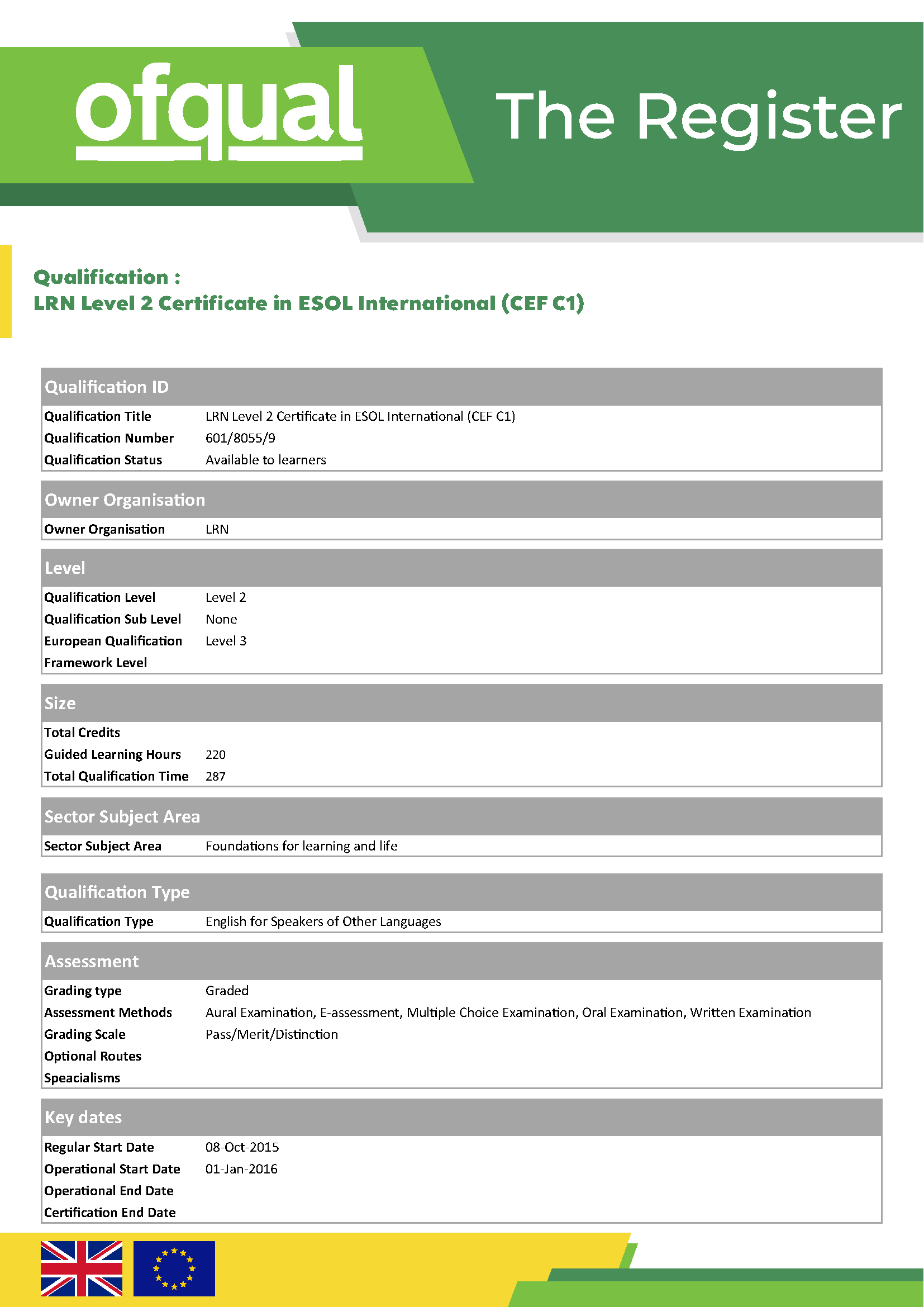CEFR English level C1Inspection and accreditation code of the UK government: Ofqual 601/8055/9v
According to the CEFR, English level C1 and the London Language College’s CEFR level C1 standard, learners can understand and recognise the implications of a wide range of long texts after completing the programme. Can express fluently, immediately, without difficulty in finding words to express. Can use the language flexibly and effectively for social, academic, and professional purposes. Can write clearly, coherently, and detailed on complex topics, demonstrate the ability to organise texts, make good use of linking words and linking tools.
CEFR English level C1 has the Ofqual verification code 601/8055/9, is an English programme that meets the UK’s CEFR English level C1, is recognised in the UK, Europe and most countries and territories, including Vietnam.
Learners can learn, practice and have global exams through London Language College’s PPP (Practice & Preparation Provider).
CEFR English level C1 has an inspection code of the UK government Ofqual 601/8055/9. Check here
Training Programme
CEFR English level C1 includes classroom activities combined with the online review system. Step by step, each lesson will help learners increase their English ability to meet the English level C1 – CEFR competency framework fully and confidently achieve the UK CEFR English level C1 certificate.
CEFR English level C1 Lessons:
- Lesson 1: Social media
- Lesson 2: You are about to be a father
- Lesson 3: Distinguishing Lay vs Lie
- Lesson 4: Movie
- Lesson 5: Art
- Lesson 6: Knocking at the door
- Lesson 7: Current problems
- Lesson 8: Distinguishing Bear vs Bare
- Lesson 9: Distinguishing Wish / If only
- Lesson 10: Aliens
- Lesson 11: Nouns used in the past
- Lesson 12: A week in Paris
- Lesson 13: Books & Literature
- Lesson 14: Environment
- Lesson 15: Distinguishing Borrow Vs. Lend vs Loan
- Lesson 16: (Grammar) phrasal verbs
- Lesson 17: The Toy That Came Alive
- Lesson 18: Lifestyle
- Lesson 20: Mixed conditional sentences.
- Lesson 21: Noisy neighbours.
- Lesson 22: Development of science.
- Lesson 23: Elicit vs Illicit
- Lesson 24: Communication
- Lesson 25: An unnamed child
- Lesson 26: Narrative
- Lesson 27: News
- Lesson 28: Inversion
- Lesson 29: English in engineering and law
- Lesson 30: Distinguishing between Affect vs Effect
- Lesson 31: Regret
- Lesson 32: Passive
- Lesson 33: The meaning of life
- Lesson 34: The Chest
Preparation for the CEFR English level C1 exam
The preparation pack will help students familiarise themselves with London Language College’s global exam; be equipped with methods and ready mentality for the best completion of the exam process.
In this section, participants are provided with:
- Sample tests
- Introduction of the exam process
- The process of marking and announcing the results
- Certification process if passed
- Re-examination process if not passed
- The mock test before the official exam.
Training listening skills in CEFR English level C1
Overall listening skills
- Can follow and understand long speeches on complex and abstract topics even when the speech structure is unclear, and the connection between ideas is implicit.
- Can follow and understand the conversations between native speakers or people who are not directly conversing with.
- Can follow and understand the abstract discussions or arguments.
- Can understand the necessary information when listening to the announcements through mass media.
Listening to the interaction between native speakers or those who are not directly conversing with
- Can follow and understand complex conversations between native speakers even when the content is on abstract, complex, unfamiliar topics.
Listening to presentations and conversations
- Can follow and understand most lectures pretty easily as well as discussions and debates.
Listening to announcements, guidelines, instructions
- Can understand specific information from public announcements with sound interference such as stations, airports, etc.
- Can understand complex technical information such as operating instructions, technical details, and familiar products and services.
Listening to the radio and watching television
- Can understand various radio and television programmes that use non-standard language; recognise the subtle details, including attitudes and implicit relationships between communicators.
Training speaking skills in CEFR English level C1
Overall monologue skills:
- Can express ideas fluently and instantly, with almost no difficulty. Can make good use of an extensive vocabulary, capable of handling the lack of words by replacing them with a lengthy way of saying.
Monologue: Describing the experience
- Can provide clear and detailed descriptions of complex topics.
- Can describe and report meticulously, integrate small topics, develop specific ideas into appropriate conclusions.
Monologue: Presenting to the audience
- Can present a clear and scientifically organised presentation on a complex topic, expand and strengthen personal opinion with relevant arguments and examples.
- Can control emotions well when speaking, show up naturally, and take almost no effort.
Overall interactive speaking:
- Can express oneself fluently, naturally, and without exerting too much effort. Mastered the vocabulary and can easily apply it in difficult situations. No more searching for wording or trying to avoid the questions.
Interactive speaking: Conversations
- Can use language flexibly and effectively for social purposes, including emotional expressions, insinuations, jokes.
Interactive speaking: Transaction of goods and services
- Can use the language to negotiate a solution for disputes such as travel tickets, poor services, financial liability for damage or liability for goods and services that do not comply with the contract.
- Can draft a compensation script, using persuasive words to achieve satisfaction, and clarify the limits of any concessions prepared.
Interactive speaking: Interview
- Can perform well the roles of interviewer and interviewee, expand and develop the discussed topic fluently without any support, and deal effectively with the external threads.
Pronunciation and fluency
- Can change intonation and place the correct stress to express subtle nuances of meaning.
- Can express thoughts fluently, naturally, and with almost no difficulty. Only some conceptually difficult topics can interfere with the flow of fluent and natural expression.
Accuracy and conformance of sociolinguistics
- Can accurately, confidently, and effectively use pronunciation, vocabulary, and grammatical structures in communication, but sometimes have to stop the sentences, change ideas, and find other wording.
- Can recognise many idiomatic or colloquial expressions, feel changes in communication, but sometimes still have to ask for details, especially when hearing unfamiliar voices.
The level of completing the exam mission
- Complete well the exam tasks; most of the answers are appropriate.
Training reading skills in CEFR English level C1
Overall reading skills
- Can understand long and complex documents in detail, even those not in the area of expertise, provided that difficult passages are re-read.
Reading for information and argument.
- Can comprehensively understand many types of long, complex documents commonly encountered in social life, in the work or academic environment, and identify subtle details such as implicit or explicit attitudes or opinions.
Reading for orientation
- Can quickly skim long and complex texts to locate useful information.
- Can quickly determine the content and usefulness of the articles and reports covering a wide range of professional topics to decide whether to read more carefully.
Reading correspondence
- Can understand all kinds of letters, but sometimes must use a dictionary.
- Can fully understand long, complex instructions on a new machine or process, even if it is not relevant to personal expertise. But still, need to re-read difficult sections.
Reading for word processing.
- Can summarise long and difficult texts.
Training writing skills in CEFR English level C1
Overall production writing
- Can write detailed, clear, tightly structured articles on complex topics, highlight important points, expand supporting arguments and facts of view with evidence, specific examples, and the summary, which leads to the appropriate conclusion.
Productive writing: Creative writing
- Can write clear and detailed descriptive and creative essays with a tight structure, with a confident, personal and natural style suitable for readers.
Productive writing: Writing reports and essays
- Can write clear and well-structured comments on complex topics, emphasising the relevant outstanding essential points.
- Can write the implementation of ideas and defend their point of view with a certain length and with specific opinions, arguments, and shreds of evidence.
Interactive Writing: Overall interactive writing
- Can express oneself clearly and accurately, connect with the interlocutor flexibly and effectively.
Interactive Writing: Correspondence
- Can express oneself clearly and accurately in personal correspondence, use the language flexibly and effectively, including telling emotions, insinuations and jokes.
Interactive Writing: Taking notes, texting and filling in forms
- Can write simple informational notes about friends, services staff, teachers, and people that often meet in everyday life, clarifying the important points in messages.
- Can understand messages with requests or problem explanations.
Word processing
- Can summarise long and complex texts.
Common language criteria
- Can choose an appropriate expression from a wide range of vocabulary to express oneself clearly without showing the limits of what the writer wants to convey.
Vocabulary range
- Proficient in a wide range of vocabulary; can fill gaps using lengthy explanations, still have to search for the right words or use evasive expressions. Proficient in idiomatic phrases and colloquialisms.
Control of vocabulary
- Sometimes make a few minor mistakes, but no serious errors in using words.
Grammatical accuracy
- Always maintain a high level of grammatical accuracy and rarely make mistakes; if do, it’s difficult to defect.
Orthographic accuracy
- Layout, segmentation, and use of punctuation are consistent and logical. Spell correctly in writing but sometimes make minor mistakes due to inattention.
18-minute Speaking exam

60-minute writing exam

60-minute reading comprehension exam

35-minute listening exam

Marking and result evaluation

Results Information
Process of announcing the CEFR English exam results:
- Exam report – Statement of Result (SoR) & e-certificate within 30 working days. SoR will email each candidate or send the report via the PPP system of London Language College.
- Hard-copy certificates will be delivered within 45 working days upon the date of result availability. Candidates can also contact authorised PPPs of London language college to receive.
For further information, please get in touch with PPPs of London Language College.
Receptive skills after LRN CEFR C1
Listening skill
- I can understand long speeches, even when the structure is unclear.
- I can understand TV shows and watch movies without trying too hard.
Reading Skills
- I can understand long texts, complex literary works and feel writing style.
- I can understand lengthy articles about my expertise or technical instructions, even those not relevant to my field.
Interactive skills after LRN CEFR C1
Interactive speaking
- I can express my ideas fluently and naturally and have no trouble figuring out how to express them. I can use the language flexibly and effectively for social and professional purposes. I can give exact opinions and views and skillfully communicate with others.
Interactive writing
- I can write responses with clear, precise, flexible and effective expressions with the right style.
Interactive skills after LRN CEFR C1
- I can write responses in an exact, accurate, flexible, and efficient way with appropriate style.
Applicable skills after completing LRN CEFR C2
Speaking
- I can present clear and detailed complex topics covering many subtopics, go into specific issues, and show the appropriate conclusions.
Writing
- I can write a well-structured essay that expresses my point of view with a certain length. I can write letters, articles, or a report on complex subjects highlighting outstanding issues. I can choose the right style for the reader.

